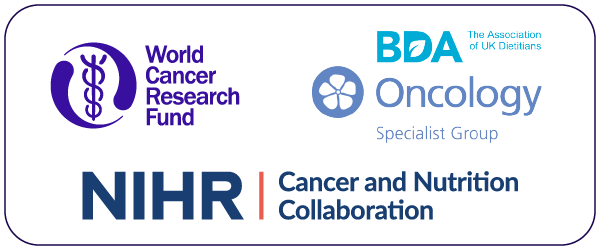Resources
Prehabilitation and Rehabilitation webinar series
Macmillan Cancer Support has recently taken over the running of the monthly prehabilitation/rehabilitation webinar series previously organised by Wessex Cancer Support. Webinars are recorded and available to watch back if you were unable to join live. View the series here, including the session run by NIHR Cancer and Nutrition Collaboration member Dr Maria Pufulete, who presented the findings from our recent Freedom of Information request analysis of prehabilitation services and practice in the UK.
Living with cancer – your patients’ questions answered
When a patient is going through cancer treatment, we know they will have all sorts of queries relating to what they should eat and drink, and how much physical activity they ideally need. For a list of answers to the most common questions about diet and exercise during cancer treatment, visit this new joint World Cancer Research Fund, BDA and NIHR resource.
Eliminating Weight Stigma – BDA Guidelines
The British Dietetic Association recently published guidelines on the language used in communications about overweight and obesity to end weight stigma as an organisation. The NIHR Cancer and Nutrition Collaboration supports these guidelines and encourages its members to use the language suggested in their own work.
The guidelines are available here.
New training resource for patient and public contributors
NIHR Involve has developed a new online training resource for patient and public contributors.
The course covers reviewing in all contexts for NIHR research funding programmes, plus skills and activities required at different levels and stages of research. It is designed for public contributors who are committee members as well as public reviewers.
Access the training resource here.
Guidance on mechanisms for gaining support for your grant application
The NIHR Cancer and Nutrition Collaboration provides support and expertise for researchers in developing grant applications. This document provides guidance about how to obtain this support, and outlines the nature of the support that we can offer.
Guidance on mechanisms for gaining support for grant applications
Frequently Asked Questions – resources for media use
The collaboration has put together this resource of FAQs for our colleagues to use when speaking about the Cancer and Nutrition NIHR infrastructure collaboration either to media or presentations to colleagues.
If the Cancer and Nutrition NIHR infrastructure collaboration is featured in the media, please share the coverage with us.
Commentary on news coverage on nutrition education in the medical workforce
The Cancer and Nutrition NIHR infrastructure collaboration has commented on recent features in the news regarding nutritional education for the medical workforce. Click here to read our commentary.
BDA Response to ESPEN Guidelines on nutrition in cancer patients
The British Dietetic Association Specialist Oncology Group has responded to the ESPEN guidelines on nutrition in cancer patients, which was published in 2016. Read their response here.
Sugar Awareness Week
Monday 30th October – Sunday 5th November is Sugar Awareness Week 2017, run by Action on Sugar. WCRF recommends limiting high-calorie foods and avoiding sugary drinks because they increase our risk of becoming overweight or obese, which in turn increases our risk of many common cancers. Read more about limiting sugar intake in the diet here.
Survey for NCRI Clinical Study Groups
The survey about nutrition-related research can be downloaded here
WCRF Colorectal Continuous Update Project Report
In September 2017, WCRF published a report on colorectal cancer. The report is the most rigorous, systematic, global analysis of the scientific research currently available on diet, weight, physical activity and colorectal cancer, and which of these factors increase or decrease the risk of developing the disease.
Phase II report of collaboration activities
On Monday 7th August 2017, the report of Phase II activities was published. The purpose of the report is to capture the experience in developing the Cancer and Nutrition NIHR infrastructure collaboration during Phases I and II of its activities and look ahead to Phase III. It sets out what has been achieved to date, and the opportunities for future joint working. This is an exciting time for the collaboration, as we have built a community of around 100 people from across the UK who work in cancer and/or nutrition and have come together with the intention to deliver research that will lead to better advice, better care, and better outcomes for people living with cancer.
To download a PDF of the report, either as an A4 format, or in double-page format, please click on the links below.
Phase II Report double page format
Macmillan Physical Activity Report
Macmillan provides a service called ‘Move More’ which providing tailored, one-on-one behaviour change support to help people living with cancer (PLWC) to become more active or maintain a level of physical activity, depending on their stage of the cancer journey. They have just published a report to evaluate the programme.
ESPEN expert group recommendations for action against cancer-related malnutrition
Published in June 2017, the expert group highlighted three key steps to update the nutritional care of people with cancer:
- Screen all patients early on regardless of body mass index or weight history
- Expand nutrition assessment practices to include measures of anorexia, body composition, inflammatory biomarkers, resting energy expenditure and physical function
- Use multimodal interventions with individualised plans, including care focused on increasing nutritional intake, lessening inflammation and hypermetabolic stress, and increasing physical activity
The ESPEN recommendations can be accessed here
ESPEN guidelines on nutrition in cancer patients
Published in July 2016, these evidence-based guidelines were developed to translate current best evidence and expert opinion into recommendations for multi-disciplinary teams responsible for identification, prevention, and treatment of reversible elements of malnutrition in adult cancer patients. The guidelines were commissioned and financially supported by ESPEN and by the European Partnership for Action Against Cancer (EPAAC), an EU level initiative. There was no formal involvement of patient groups in formulating the guidelines.
The guidelines include 42 recommendations for research, of which 26 are STRONG; 17 of the STRONG recommendations have either LOW OR VERY LOW evidence; in total 30 recommendations have either LOW or VERY LOW evidence; only 3 are STRONG with HIGH evidence ; and 7 research recommendations are STRONG with MODERATE evidence. Therefore the opportunity for carrying out research to build the evidence base on which clinical guidelines are based is significant.
The ESPEN guidelines can be downloaded here
Outreach
We would like to encourage members of all work streams to take every opportunity that arises to spread awareness of the Cancer and Nutrition NIHR infrastructure collaboration. Opportunities such as presenting to organisations or to your colleagues would be welcomed to raise awareness of our work.
PowerPoint Slides
These PowerPoint slides are available for you to download and use for your presentations. They may be modified to ensure that the presentation is the right length of time for your speaking opportunity. If you would like to make any changes to the content of the slides, please contact the project management team.
Presentation pack – click to download
Contact details collection
It is likely that following your presentation, members of the audience may want a way to stay in touch or get involved with the collaboration. Please offer this template to your audience to help us collect details of interested parties. If you collect any contact details, please scan and email or post the data collection form back to us so we can add the details to our database.
Contact details collection form – click to download
Keep us informed!
We would like to keep a record of your engagement and outreach activities. If you have given a presentation about the Cancer and Nutrition NIHR infrastructure collaboration, we would like to ask you to write a short summary report (approximately 1 page) of how it went, key points raised in discussion and any questions that were raised. These reports will be uploaded to our website. Please email the report to the project management team: cancer_nutrition@nihr.ac.uk


